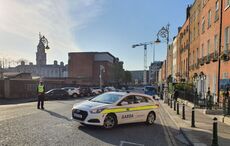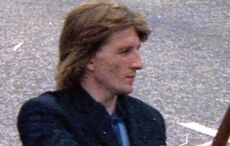Prominent Irish-Americans and Irish involved in Northern Ireland’s peace process have been giving their reaction to the news that Hugh Orde, the head of the Police Service of Northern Ireland, is to step down.
He took over as head of the police service seven years ago, and is to become president of the Association of Chief Police Officers of England, Wales and Northern Ireland.
Orde, who is 50 and from Surrey in England, helped steer the police service as it found its new role in post-conflict Northern Ireland.
In 2001, the old police force, the Royal Ulster Constabulary (RUC), was replaced by the new Police Service of Northern Ireland (PSNI).
Former congressman Bruce Morrison, the author of the Morrison Visas, said that Orde has done and “excellent job” and that he had “acquitted himself with great distinction.” The police force in Northern Ireland today, Morrison said, was in stark contrast to the RUC, which was often “above the law.”
The recent outbreak of violence in Northern Ireland, Morrison added, in which two British soldiers and a police officer were murdered by dissident Republicans, saw Orde give a “telling performance.” Orde saw this as a police enforcement issue, and not a military issue, according to Morrison, which was the right decision to make.
“It’s certainly a very different policing environment than when he took over, and all for the better,” the former congressman said.
Dr. Gerald Lynch, President Emeritus at the John Jay College of Criminal Justice in New York, got to know Orde well, when both of them served on the Patten Commission, the commission set up under the terms of the Northern Ireland peace accord, the Good Friday Agreement, to reform Northern Ireland’s policing system.
“He did an absolutely superb job in an almost impossible position,” Lynch told IrishCentral.
“It was a real baptism of fire for him when he took over – a lot of the time, he was between a rock and hard place. There were a lot of strong personalities he had to deal with – men like Gerry Adams and Ian Paisley are no pushovers.”
Reform of policing in Northern Ireland was one of the politically most difficult – and important - tasks to be undertaken following the 1998 Good Friday Agreement.
Nationalists, many of whom hated the old police service, the RUC, identifying it as a symbol of British oppression, wanted a speedy pace of reform.
But some of these reforms were very difficult for unionists to stomach: many RUC members had been killed by the IRA in the Troubles, and some unionists felt that changing its name as well as removing old flags and symbols associated with the RUC, was an insult to to RUC members.
In other words, much of the time, Orde had to walk a very careful path. He inevitably ended up taking criticism from both nationalists and unionists, but managed to earn the respect from both.
“’People often said to us: ‘If you can’t get policing right, you can’t get the Good Friday Agreement right,’” Lynch said. “There were 175 recommendations issued by the Patten Commission – and if you look at them now, I think almost all of them have been implemented.”
Bill Flynn, the former chairman of Mutual of America, who was one of a group of Irish Americans who acted as a liason between Sinn Fein and the U.S. Government in the 1990s, told IrishCentral that Orde "brought a much wider degree of support for the police. And all of this is going to be much needed now that these dissidents are acting up."
Flynn, who described Orde as a close personal friend, described Orde as "the Ray Kelly of Northern Ireland."
Rita O’Hare, the representative of Sinn Fein to the U.S., told IrishCentral that Orde “came in to a very difficult position.”
“We’d be very happy to acknowledge that he did a good job. He inherited a situation from the RUC that was very difficult. We do have some criticisms of his handling of various issues – he unfortunately continued the old practice of the North of withholding information from inquests. But elsewhere, he has shown a certain amount of courage.”
Alex Maskey, a Sinn Fein member of Northern Ireland’s Assembly, who sits on Northern Ireland’s Policing Board – the authority set up to supervise the PSNI - said: “I’ve been on record as saying that Huge Orde has made a very significant contribution to policing in Northern Ireland. But there is a lot of work that remains to be done and I look forward to working with the new PSNI head in the future.”
Maskey said that he found Orde “very open” to deal with.
“We would have disagreed on any number of issues but we were always able to get on with things and work with one other.”




Comments